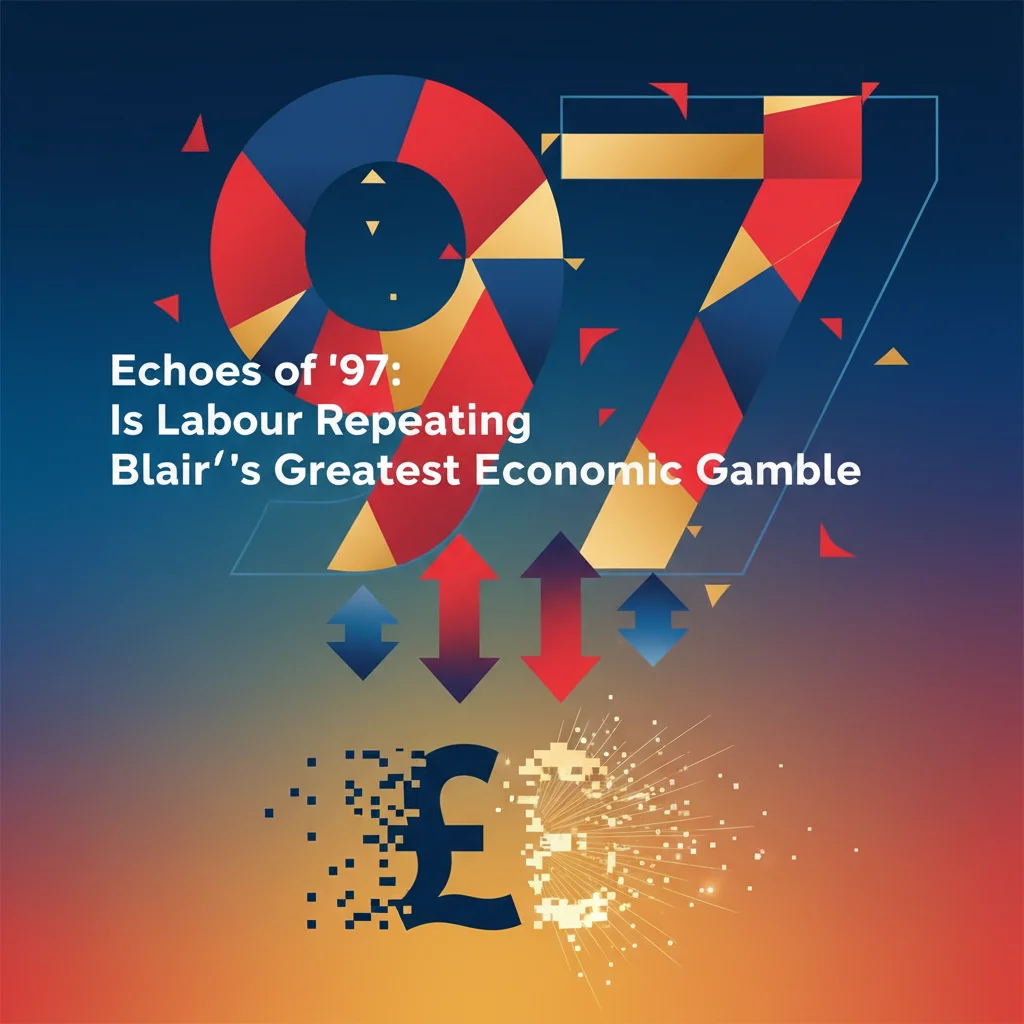
Echoes of ’97: Is Labour Repeating Blair’s Greatest Economic Gamble?
In the annals of modern British politics, the 1997 general election stands as a seismic event. Tony Blair’s New Labour swept to power with a landslide victory, ending 18 years of Conservative rule. Yet, their first move was not a radical overhaul but a surprising act of conformity. As a recent letter to the Financial Times from Judith Martin of Winchester points out, the incoming government made a deliberate choice to stick to the spending plans of their Tory predecessors for two full years. This decision, aimed at reassuring a skeptical public and nervous financial markets, is now at the center of a new debate as Sir Keir Starmer’s Labour Party appears poised to adopt a similar strategy.
The question is no longer just a historical curiosity; it’s a live issue with profound implications for the UK’s future. Was Blair’s initial austerity a masterstroke of political pragmatism that paved the way for a decade of investment, or was it a costly error that left public services playing catch-up for years? More importantly, in an economic landscape ravaged by a pandemic, an energy crisis, and chronic low growth, would repeating this playbook today be wise, or would it be a catastrophic miscalculation? This analysis will delve into the economics and politics of the 1997 decision, its long-term consequences, and what it means for investors, business leaders, and the future of the UK economy.
The 1997 Pledge: Securing Credibility at a Cost
To understand the decision made by Tony Blair and his Chancellor, Gordon Brown, one must appreciate the political and economic climate of the mid-1990s. The Labour Party was still haunted by the “Winter of Discontent” of the 1970s and the perception of being the party of high taxes, high spending, and economic mismanagement. The Conservative party had successfully weaponized the “tax and spend” label against them for nearly two decades. For New Labour to win, they had to prove they could be trusted with the nation’s finances.
The strategy was clear: demonstrate fiscal prudence above all else. Gordon Brown’s pledge to adhere to the spending limits set by his Conservative predecessor, Kenneth Clarke, was the cornerstone of this approach. It was a message aimed squarely at the City of London, international investors, and the swing voters of “Middle England.” The goal was to neutralize the Tories’ main line of attack and prevent a run on the pound or a spike in government borrowing costs upon their election.
This move was coupled with another significant step to bolster their credibility: granting independence to the Bank of England to set interest rates just days after taking office. This was a powerful signal that monetary policy would be taken out of the hands of politicians, further reassuring the financial world. The immediate reaction from the **stock market** and in **banking** circles was positive. The new government was seen as a “safe pair of hands,” a perception that helped stabilize the **economy** in the short term.
However, this stability came at a price. The inherited spending plans were tight, and two more years of restraint meant that crucial public services like the NHS and education, which were already showing signs of strain, were starved of needed investment. The FT letter’s author argues this was a fundamental error, stating that the “underfunding of public services” was a direct consequence of this policy. Indeed, many on the left of the party at the time felt it was a betrayal of Labour’s core values, delaying much-needed social repair for the sake of political optics.
The Bank of Mom and Dad vs. Fintech: Why Informal Loans Are Winning the Credit War
Austerity First, Investment Later: Did the Gamble Pay Off?
After the initial two-year period of restraint, Labour’s spending policy changed dramatically. From 1999 onwards, the government opened the taps, presiding over the longest period of sustained investment in public services in a generation. According to the Institute for Fiscal Studies (IFS), public spending as a share of national income rose significantly, funding widespread reforms and modernization in healthcare and education.
The table below illustrates the stark contrast between the initial years of caution and the subsequent period of investment, a key element of New Labour’s approach to **economics**.
| Period | Average Total Managed Expenditure (% of GDP) | Key Policy Stance |
|---|---|---|
| 1997-1999 | ~37.5% | Adherence to Conservative spending plans; focus on fiscal credibility. |
| 2000-2007 | ~40.8% | Significant increases in spending on NHS, education, and public services. |
Source: Adapted from historical data from the Office for National Statistics and IFS analysis.
Proponents of the original strategy argue that the initial two years of austerity were a necessary evil. By establishing a reputation for fiscal responsibility, Brown and Blair created the political and economic space for their later spending increases. They had earned the trust of the markets, which meant they could borrow and invest without causing a financial crisis. In this view, the “decade of investment” would not have been possible without the foundation of credibility laid between 1997 and 1999.
Critics, however, maintain that the delay caused lasting damage. It created a deep hole in public service funding and capacity that required even greater sums of money to fix later on. They argue that the government could have invested earlier, alleviating pressure on schools and hospitals, without spooking the markets, especially given the scale of their parliamentary majority. The debate continues to this day: was it a pragmatic masterstroke or a timid and unnecessary concession?
Déjà Vu? Starmer, Reeves, and the New Fiscal Orthodoxy
Fast forward to today, and the parallels are striking. The Labour Party, under Sir Keir Starmer, has worked tirelessly to distance itself from the economic policies of the Jeremy Corbyn era. Shadow Chancellor Rachel Reeves has spoken of “iron-clad fiscal rules” and has committed to ensuring that national debt falls as a share of the economy. Much like in 1997, the strategic objective is to project an aura of competence and reassure business leaders and investors that a Labour government will not engage in reckless spending.
The political logic is identical: neutralize Conservative attacks and win the battle for economic credibility before a single vote is cast. However, the economic backdrop could not be more different. The UK is grappling with the highest tax burden since World War II and a national debt exceeding 100% of GDP, according to the latest figures from the Office for Budget Responsibility. Public services are visibly crumbling after more than a decade of austerity, a pandemic, and an inflation crisis.
In this context, promising to adhere to tight fiscal constraints is a far riskier proposition. While it may soothe nerves in the short term, it leaves almost no room for the kind of public investment needed to stimulate growth. Addressing the UK’s productivity puzzle, upgrading its aging infrastructure, and leading the green transition all require significant upfront capital expenditure. A strategy of fiscal caution could inadvertently lock the country into the very cycle of low growth and high taxes it purports to solve.
Reality Check: Why Farage's £90bn Tax Cut Retreat Signals a New Economic Era for the UK
The Investor’s Dilemma: The Price of Stability vs. the Promise of Growth
For those involved in **finance** and **investing**, this political dynamic creates a complex dilemma. On one hand, a government committed to fiscal discipline is predictable. It suggests stability for the currency and for government bonds (gilts), which can reduce systemic risk across the **stock market**. A government that avoids fiscal shocks is often seen as a positive for the overall investment climate.
On the other hand, stability without growth is a hollow prize. Long-term investment returns are driven by economic expansion, corporate earnings, and innovation. A government that prioritizes balancing the books over investing in the future may create a stable but stagnant economy. This presents a challenging environment for equity investors and venture capitalists. Key growth sectors, from renewable energy to **fintech** and artificial intelligence, rely on a supportive ecosystem fostered by public investment in education, research, and digital infrastructure. Even emerging technologies like **blockchain** require a dynamic economic environment to find real-world applications and attract capital.
A policy of extended fiscal restraint could therefore lead to a bifurcated market reaction. Bond markets and currency **trading** desks might initially welcome the caution. However, equity analysts and long-term investors may downgrade UK growth prospects, leading to capital flight from UK-domiciled companies and a less attractive environment for foreign direct investment. The ultimate test for the next government will not be its ability to manage the national credit card, but its ability to grow the size of the entire economic pie.
The Chancellor's Gambit: Navigating a "Fair" Budget in a Turbulent UK Economy
Conclusion: A Different Era Demands a Different Playbook
The letter from Judith Martin serves as a poignant reminder that political-economic decisions have long and complex legacies. The New Labour government’s 1997 choice to embrace Tory spending plans was a calculated gamble born of the specific political anxieties of its time. While it arguably succeeded in its primary goal of establishing credibility, it came at a significant social cost and delayed urgent investment.
To simply copy that strategy today would be to ignore the profound shifts in the global and domestic **economy**. The UK of 2024 is not the UK of 1997. It is a country burdened by higher debt, facing fiercer global competition, and crying out for a coherent strategy for growth, not just a plan for budget management. The challenge for any incoming government is to forge a new path that marries fiscal responsibility with a bold, ambitious, and credible plan for investment. Simply repeating the past is a luxury the UK economy can no longer afford.


